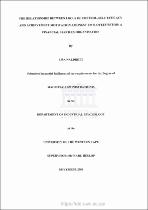| dc.description.abstract | In an attempt to create a workforce that is representative of the demographic profile of the new South Africa, recruitment and appointment of racial groups and minority groups are the order of the day (Bothma & Schepers, 1997). Many South African organisations attempt to predict levels of job performance, through the use of competency-based interviews, cognitive measures, and or work simulations (role
plays) prior to employment. According to Van Zyl and Visser (1998), psychometric tests are largely based on either overseas or South African middle class White values or norms and knowledge, and are less valid for groups from different social and ethical backgrounds. Large portions of tests used in organisations are mainly based on verbal and numerical cognitive reasoning. However, due to discrimination in past and even current educational systems Black applicants may not always pitch at the level as that of White candidates. Bothma and Schepers (1997) postulate that proof of educational qualifications bare little evidence of competence and do not necessarily ensure high levels of job performance. An issue of interest to behavioural scientists is the question of whether personality factors measured by questionnaires such as the Occupational Personality Questionnaire, Customer Contact Styles, Myers Briggs Type Indicator, Locus of Control Inventory, Achievement Motivation Questionnaire and Self Efficacy can predict performance in organisations (La Grange & Roodt, 2001). According to Bothma and Schepers (1997), work performance is a human function based upon many inputs and types of learning. It is therefore very important that
instruments used to determine an individual's work performance focus on basic psychological constructs , such as their locus of control , need for achievement and self-efficacy. | en_US |

